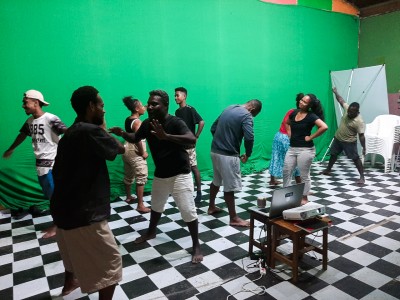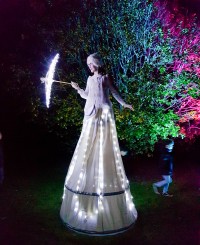
Zoom-led Performance and Movement Class - Dreamcast Theatre
Qeto Darcy had always been interested in music and dance so when he got the opportunity to be choreographer for the Solomon Islands’ burgeoning arts community project Dreamcast Theatre in 2018, he didn’t think twice.
Officially formed in 2015, Dreamcast Theatre is a place where artists of every discipline give free rein to their creativity, a space where they can create, collaborate, perform, trade, learn, train and pursue a better vision for themselves and their country.
Qeto believes there is a need for expression and that’s exactly what Dreamcast does from the art hub in Honiara he now works in.
“It’s there for everyone, whoever comes in, with whatever it is - as soon as you enter the gate we made a policy that you’re part of Dreamcast.”
Qeto describes Dreamcast as a safe space for young creative people and develops skills across multiple creative disciplines, including performance, photography, film-making, poetry and writing.
Theatre shows are produced and places are sourced for everyone. For those who can’t be in front of the camera, there are always background supporting roles. This has led to gigs with private companies hiring to make films and photography, including work in the provinces.
“We’re working on all sorts of income-generating activities right now,” says Qeto, “and most of the volunteers that have come through have gained recognition for their work”.
“It is very important that everybody feels a sense of our purpose and many people, whenever they come in, just want to remain at the hub and get involved.”
With a growth in the creative industry, Dreamcast has identified the need to widen its teaching ability and provide structured workshops for its community.

Ayesha’s performance art on stilts
Volunteer Service Abroad has played a role in that vision, partnering with Dreamcast in 2019 and recruiting volunteer Ayesha Evans to share her experience in performance and movement.
As a circus and physical theatre performer for more than 30 years in New Zealand, Ayesha’s goal was to train the trainers so more lessons could be offered to a greater number of people in the Solomon Islands.
When borders closed and Ayesha was unable to travel to the Solomon Islands, she instead set up a Zoom chat to demonstrate movement and technique.
“They’ve got a camera and they’ve got me projected up on one of their walls in the theatre space, so I can see them and give them feedback,” says Ayesha.
The internet and electricity connectivity often drops out in the Solomon Islands, which has also been challenging, but after months of people connecting with Ayesha there is now a group at the art hub ready to go out and encourage more people to express themselves creatively.
As it grows, Dreamcast is becoming recognised as a hub for arts and culture in the Solomon Islands and that is attracting more talent and more industry support.
“In the Solomon Islands Dreamcast is the art hub where people come to do their work so whenever there is work to be done whenever there is a contract to be given out all these companies come to us,” says Qeto.
As for Ayesha? She eventually hopes to travel and work alongside the Dreamcast crew.
The experience she’s shared as part of her volunteer assignment is just one way to build capacity in the Solomon Islands.
